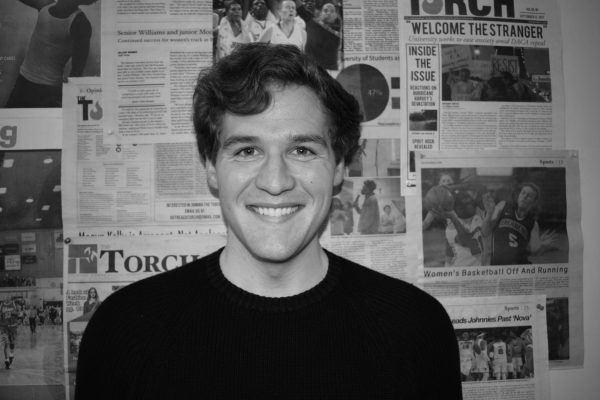
“Queer,” is not at all similar to the other romance films that have made filmmaker Luca Guadagnino’s career. The latest film from the “Call Me by Your Name” and “Challengers” director released to select theaters on Nov. 27 but will receive a nationwide theatrical run starting on Dec. 13.
Audiences are transported to Central America in the 1950s, where William Lee (Daniel Craig) plans to aimlessly live out his life in a destructive haze of drugs and alcohol. During a night out, Lee becomes infatuated with Eugene Allerton (Drew Starkey), a much younger man. The film tells the journey of their tumultuous relationship and the different places their strange love takes them.
Guadagnino and “Challengers” writer Justin Kuritzkes adapted the screenplay from William S. Burroughs’ book of the same title. The pair attempted to bring Burroughs’ experimental and interpretive work to the screen solely through the compatibility of the characters.
“Are we ready for connection?,” Guadagnino said in an interview with Time Magazine. “What is preventing these characters from having a full-blown connection?”
The director explores this connection explicitly through how the two main characters’ bodies communicate with each other.
The film’s most visually striking scenes are when Lee is eagerly reaching for an unknowing Eugene, portraying the depths of his desire and passion. But at times Eugene shows utter repulsion towards Lee. His meticulously planned but silent reactions to Lee’s advances showcase his thoughts vividly. Both leads play this uncomfortable game of back-and-forth perfectly.
Craig deploys the charm seen in his past roles as James Bond or Benoit Blanc in “Knives Out,” to a much more different effect. His depiction of Lee is as a sleazy hedonist, appearing nearly predatorial at times.
As the film goes on, Lee’s grip on reality becomes strained and he seems to be on the brink of a nervous breakdown at any moment. Craig rides this fine line of control and insanity brilliantly in this role, marking one of the best performances of his career.
Drew Starkey excellently plays off the unpredictable Lee with his more introverted and reserved Eugene. Starkey hides his character’s thoughts behind a straight face, making his sparse moments of vulnerability or rage much more impactful.
In the film’s third act, the couple’s honeymoon phase ends and the story takes a unique turn.
Guadagnino splices dreams and hallucinations with reality, forming a surreal experience that at times feels like a nightmare. There are moments of sensuality between the two leads like a scene out of Guadagnino’s body horror films “Suspira” or “Bones and All.”
But there are tender moments that display the beautiful potential of this relationship, showing that these characters may be ready for the connection that they seek.
Complimenting the rapidly switching tones of this film is an erratic soundtrack featuring popular songs from Nirvana and Prince. This is an odd choice for a strict period film, but this decision pays off remarkably.
These songs from different periods continue to blur the lines between reality even more but create memorable moments in the process.
While the soundtrack is great, Trent Reznor and Atticus Ross’ accompanying score is the most impactful music in the film, turning in one of their most unsettling and remarkable scores yet. The former Oscar winners’ score is the driving force behind many scenes, helping the film’s unique atmosphere.
Guadagnino ends this film with an existential reflection of the entire relationship, posing complex questions for the audience to ask themselves about their own relationships and future. But this film’s final stretch could prove very difficult to the audience that enjoyed his previous work.
“Queer” is a more challenging and unsatisfying test of patience compared to any other love story. This film does not have the lush gentleness of “Call Me by Your Name,” the competitive eroticism of “Challengers” or even the cannibalistic tenderness of “Bones and All.”
Instead, “Queer” exists in its own space. It feeds off each character’s physicality for a more constrained and subtle romance. Offering one of the most interesting and introspective films that the genre has ever seen.









